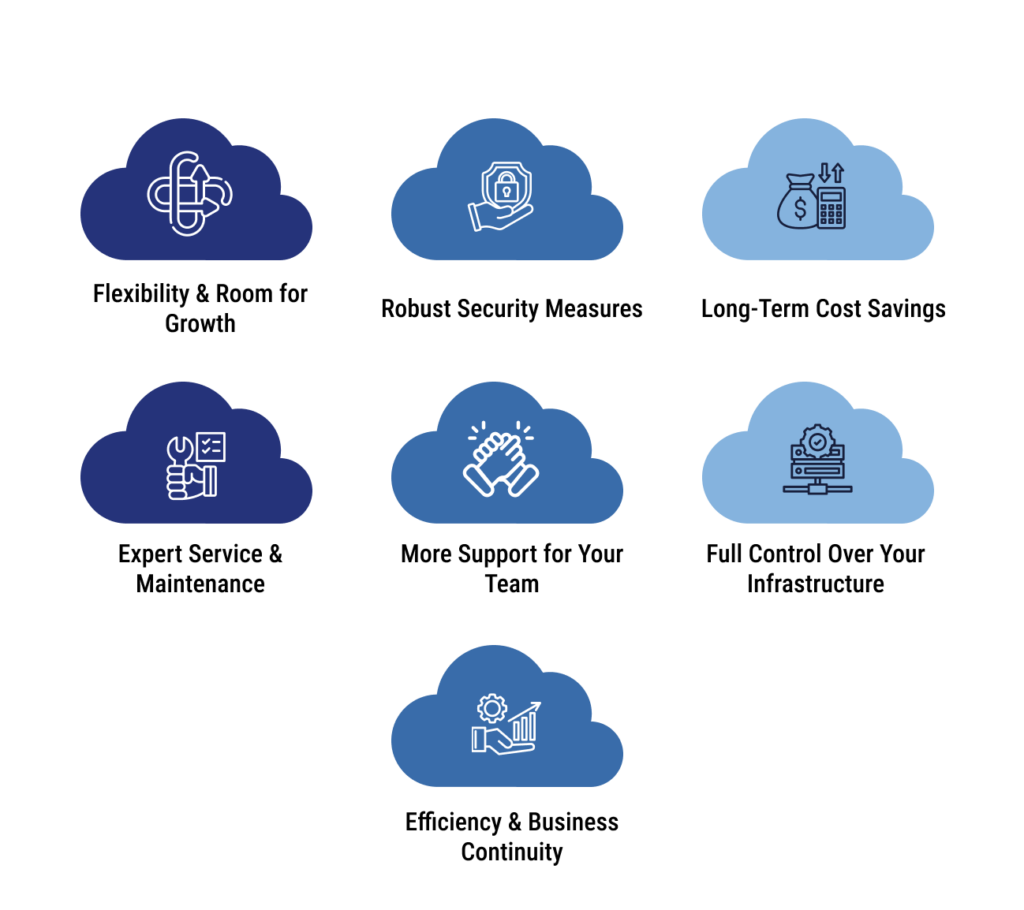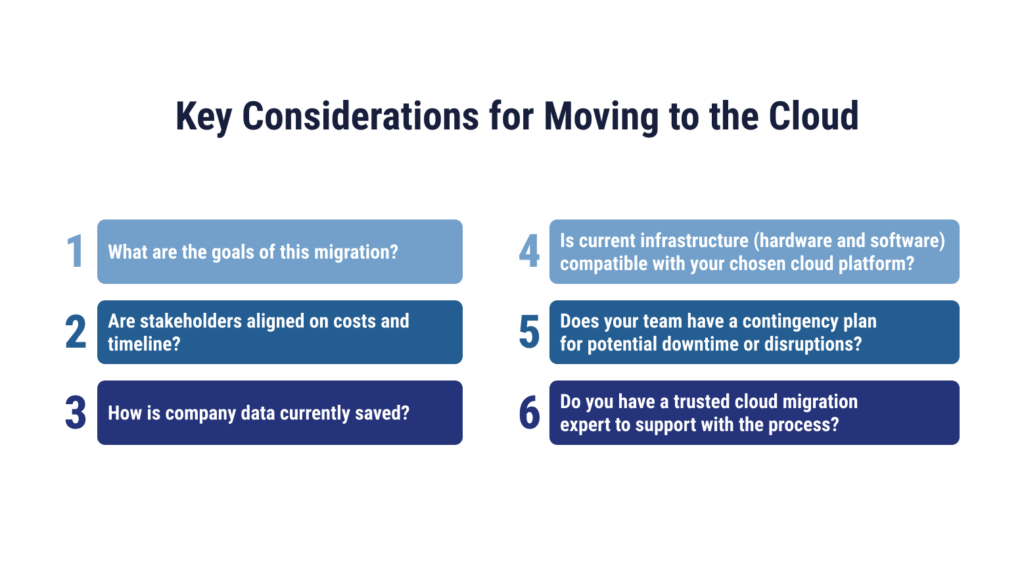
As more and more businesses embrace digital transformation, choosing the right infrastructure is more important than ever. The rise of cloud computing has made it easier and more efficient to store company data with an expert external partner rather than relying solely on traditional on-premises models.
While traditional on-premises models offer direct control over data and security, private cloud solutions provide a balance of customization, scalability, and operational efficiency.
For IT decision-makers, the choice between on-premises and private cloud storage comes down to factors like security, flexibility, and long-term growth potential. Here, we’ll compare the two options and cover the benefits related to moving to a private cloud environment.
What Is On-Premises Data Storage?
With on-premises data storage, data is stored in physical infrastructure that is hosted in an organization’s facilities. Businesses use their own hardware, including servers and storage, to house data onsite. This ownership offers the highest level of control and can be customized to meet specific security and compliance requirements, but it also requires significant resources for setup, ongoing maintenance, and hardware upgrades, placing the full burden of management on internal IT teams.
How Does a Private Cloud Storage Model Work?
A private cloud storage model offers an alternative to on-premises data storage, where organizations can use a dedicated cloud environment within their own infrastructure or at a dedicated site in a shared data center. In private cloud architecture, businesses maintain exclusive control over the environment while gaining greater flexibility, connectivity, and the ability to scale resources more efficiently than traditional on-premises storage.
Benefits of Migrating to a Private Cloud Environment
Migrating to a private cloud environment can help businesses meet growing customer demands for performance and accessibility. Private clouds can also satisfy growing concerns around data breaches and regulatory compliance.

Stringent Security and Compliance
Your mission-critical data and applications should be deployed on physically isolated infrastructure at a highly secure facility. These environments have dedicated resources for compute, memory, and storage. You may need this as part of internal best practices, to meet compliance requirements, or as part of applying for cyber insurance. Regardless of the reason, private cloud storage can help you meet strict data residency and other regulatory requirements.
Cost Savings (CapEx vs. OpEx)
In a capital expenditures (CapEx) model, businesses make large upfront investments in infrastructure and equipment to run an on-premises data center. While this can lead to long-term cost savings, the benefits are often offset by the need for ongoing upgrades, unexpected resource demands, and forecasting challenges.
Many organizations are shifting to an operational expenditures (OpEx) model, paying only for the resources they use. Private cloud storage enables this transition by reducing the need for large upfront investments. Organizations can bring their own equipment into a private cloud environment and gradually shift to third-party infrastructure, optimizing costs while benefiting from regular hardware refreshes and scalable resource allocation.
Expert Support and Maintenance
Outsourcing data storage to a private cloud environment also means that businesses can outsource their infrastructure management or supplement their internal team with expert support and maintenance from a private cloud provider. Improve security and availability with 24/7 troubleshooting and monitoring.
More Control Over Your Infrastructure
A private cloud environment allows businesses to maintain full control over their data, applications, and infrastructure. Manage changes, optimize resource utilization, and tweak system performance on your schedule instead of waiting for a cloud provider to implement wide-scale changes. If your resource needs increase unexpectedly, you can leverage the cloud for either co-managed or fully managed services.
Flexibility and Scalability
While some data may come with stringent security requirements, chances are, other data and workloads don’t need to be as fiercely protected. Moving to a private cloud storage solution also opens the door for other cloud connectivity, leveraging hybrid cloud solutions to store some data in more budget-friendly ways. Calibrate your performance, security, and resource needs with a multicloud or hybrid cloud approach that conforms to fit your business.
Simplified IT Management for Your Team
Well-managed private cloud environments can also simplify management for your internal IT teams. Oftentimes, it’s easier to automate tasks in a cloud environment compared to on-premises, reducing the manual effort required of team members. When you make your IT staff more efficient and productive, their time can be spent on other tasks.
Business Continuity
Private cloud environments enhance business continuity with built-in redundancy and Disaster Recovery as a Service (DRaaS). In the event of an outage, these redundancies ensure critical operations remain uninterrupted, minimizing downtime and data loss. Even during planned maintenance, seamless failover capabilities keep systems running, maximizing productivity and revenue. By strengthening disaster recovery strategies, businesses improve resilience, reduce risk, and build trust in their reliability and stability.
Tips for a Successful Private Cloud Migration
Before you migrate any data to a private cloud, understand the costs and complexities involved, ensure your resources are ready for the change, plan for some downtime, and consider working with a partner to make the transition smoother.

- Assess Migration Costs and Complexity
How is your data currently saved? Understand the requirements of your current applications, infrastructure, and data before you begin any kind of migration project. This should include estimates around the total cost of ownership for a new solution compared to your current environment, as well as a complexity assessment that identifies any potential risks or challenges you may encounter during migration. Understanding system dependencies is also critical, as interconnected applications and workflows can impact migration timelines and overall success.
- Ensure Hardware and Software Readiness
If you plan on taking hardware with you, verify that it’s ready and compatible to use with your chosen private cloud platform. After running compatibility checks, consider how you might optimize your workloads to improve their efficiency and performance in a new cloud environment. Your data may also need to be prepared for migration via deduplication, backup, and data cleansing. - Prepare for Temporary Downtime
While the end goal of private cloud storage is minimizing downtime, your business may experience some temporary outages during the initial migration process. Developing a contingency plan for how to handle even minor disruptions to business operations can make the migration easier to manage. You may opt for a phased approach that starts by moving less critical data as a pilot test. - Choose a Trusted Partner to Help with the Transition
Because there are so many variables involved in transitioning to private cloud storage, a qualified partner can greatly improve your migration experience. You can leverage their implementation, project management, and strategic skills, plus rely on their ongoing support, to make all stages of the migration successful.
Further Considerations: Hybrid Cloud and Multicloud Options
Moving from an on-premises environment to the private cloud will already offer significant advantages to your business, but there’s also a wider world of cloud computing to think about. Expanding services to include multicloud or hybrid cloud options can lead to greater flexibility and reliability.
Ready to Modernize Your IT Operations?
Migrating to private cloud storage can be a meaningful step toward full modernization of your IT operations. Digital transformation isn’t a one-time project; it’s an ongoing commitment to iterating and improving your systems to be more competitive in a changing technological landscape. TierPoint, as a leading provider of hosted private cloud services, can help.
Choose the private cloud environment that’s right for your business and partner with TierPoint to leverage solutions from industry-leading vendors that improve compliance, boost performance, and increase your customization and control options.

